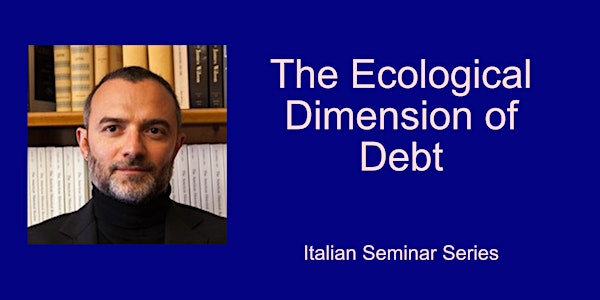Professor Andrea Righi will explore the theological, economic, and ecopolitical forms that constitute the notion of symbolic obligation, or debt, by drawing on the work of scholars like Walter Benjamin, Jacques Lacan, Giorgio Agamben, Maurizio Lazzarato, and David Graeber among others. The talk seeks to outline a new theoretical framework that sheds light on the interdependencies between concepts like debt, guilt, retribution, and redemption in Western Thought, with the objective of transcending them.
This investigation analyses the ways in which the debt-guilt relation is constructed around an exchange system (or a moral bookkeeping) characterized by rewards and penalties. Although often viewed as the basis of morality, this transactional model is rife with inconsistencies. Typically understood as an individual-confessional matter—even the national debt is often elucidated through the metaphor of private household budgeting—debt encompasses the symbolic construction of society itself. Debt functions as the mechanism conferring authority upon someone to absolve, or in economic parlance, to clear insolvency. In pre-capitalist societies, God had the capacity to redeem his subjects from sin—Dimitte nobis debita nostra (forgive our debts) recites the Lord’s prayer. Under neoliberalism, however, value assumes the transcendent role once held by the divine. The growth of value in advanced capitalism primarily occurs through extractive strategies that impose a debt-based economy on a significant portion of the planet. As Walter Benjamin observed, capitalism, due to its excessive nature, does not consider final points of restitution, balance, or expiation. Instead, it mandates perpetual growth beyond Earth's biocapacity. What modern production consumes of the planetary biomass, it fails to return. Addressing the form of the contradiction of our current ecological debt presents an opportunity to suggest alternative ecopolitical models that are environmentally sustainable.
If you have any questions about this event, please contact Riccardo Amorati at riccardo.amorati@unimelb.edu.au
The School of Languages and Linguistics strives to host inclusive, accessible events that enable all individuals to engage fully. To request an accommodation or for enquiries about accessibility, please contact soll-info@unimelb.edu.au
DATE: 8 May
TIME: 6:15 pm
LOCATION: Interactive Cinema Space Arts West (353), Parkville Campus, The University of Melbourne
Enquiries: soll-info@unimelb.edu.au
